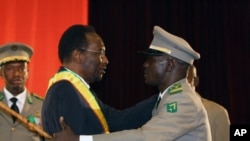In a positive step toward the restoration of a civilian-led, constitutional government in Mali, the military officers who seized power there last month have agreed to begin the transition back to democracy. The United States commends the ongoing leadership of the Economic Community of West African States, or ECOWAS, in negotiating this agreement, under which President Amadou Toumani Toure formally resigned and Dioncounda Traore, the Speaker of Mali’s parliament, has become interim president of a transitional administration until elections are held.
Subsequent to the signed agreement, ECOWAS lifted the economic sanctions it imposed on Mali after the coup. The trade and other measures would have had a broad impact on the Malian economy, which is heavily dependent on cross-border trade and currency transfers from the West African Central Bank.
The agreement paves the way for the constitutional government to address another crisis in the country, an ongoing insurgency in the north. The National Movement for the Liberation of Azawad, or MNLA, controls parts of the northern Mali and declared independence on April 6. The group, which includes many heavily armed Taureg fighters returned from service in Libya, began its campaign in January. Other armed groups, including Ansar al-Dine, are also fighting for control over Gao and Timbuktu.
The United States, long a friend of the Malian people, does not recognize the MNLA’s declaration of independence as valid. We reiterate our support for Mali’s territorial integrity, and stand by Mali’s neighbors in rejecting it. A separate Azawad state will only exacerbate the grave problems challenging the nation.
We call on the MNLA and all armed groups to cease all military operations and engage in dialogue with civilian leaders in Bamako to find a non-violent path forward for national elections and peaceful coexistence.
Mali Coup Leaders Relent

The military officers who seized power there last month have agreed to begin the transition back to democracy.



